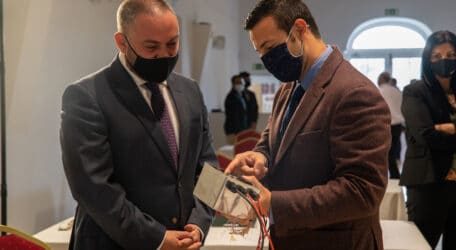
Novel EVAporative Cooled battery technology developed by local researchers
A novel technology which cools Lithium ion batteries through evaporation has been developed by local researchers and industry. The cooling technology developed in project NEVAC will overcome limitations posed by overheating batteries caused by fast charging and discharging through high current applications.
Project NEVAC is a collaboration between the Institute of Aerospace Technologies at the Universtiy of Malta, and Abertax Kemtronics. NEVAC was financed by the Malta Council for Science & Technology, through the FUSION: R&I Technology Development Programme. The consortium received circa 200,000 Euro funding for this research project.
The Minister for Equality, Research and Innovation Dr Owen Bonnici attended the Public Engagement event held at the EsploraPlanetarium, Chaplain’s Hall at Esplora Interactive Science Centre, Kalkara, to promote this innovative research and celebrate the work and results accomplished by the researchers involved. During his address he said that: “Besides the commercial value of such a venture the knowledge transfer that goes on when public and private entities work together, as in such consortia is actually priceless, and will keep on giving for years to come. Without such collaborations, these R&I projects would be impossible, and I cannot stress enough the importance for our country to keep investing in the strengthening of the research and innovation pillar which is the key for our economic growth and competitive impact.” He added that: “Malta is no longer in the backseat, waiting for foreign researchers to come up with the solutions it needs. Our Maltese researchers are now working alongside international entities and researchers, sometimes even leading the way.”
The Executive Chairman of the Malta Council for Science and Technology, Dr Jeffrey Pullicino Orlando, during his opening address said that: “MCST focuses on cultivating a culture of research and innovation in our country. We are achieving this through our various funding programmes, including the national fund called FUSION. NEVAC is another successful and innovative project funded through the FUSION Technology Development Programme, and it has now entered an exciting new phase which will see the researchers filing an international patent.” He added that: “The excellence and achievements of projects funded by the Council instil a great sense of pride in me, not only as the Executive Chairman of MCST, but also as a Maltese citizen. It is only through our collective efforts that the most fruitful rewards of scientific and technological research can be reaped.”
Lithium ion batteries are considered as a key enabling component which can power mobile phones, laptops and electric vehicles. However, these suffer from thermal limitations. The behaviour of the battery is temperature dependent and therefore effective thermal management is very important. Project NEVAC developed a self-sustained cooling mechanism, that can allow to charge and discharge the batteries at a higher rate. NEVAC exploits the concept of boiling, having multiple advantages such as the entire battery pack maintaining a single temperature, and the latent heat can extract a higher magnitude of heat from the battery cells.
Dr Robert Camilleri, NEVAC’s Project Leader within the institute of Aerospace Technology stated that: “It is becoming more obvious that we need to move towards electric transportation. However, there are still concerns about vehicle range and the ability for fast charging. Battery heating is one of the main limitations for fast charging because high current input generates excessive heat in battery cells, and presents risks for thermal runaway. Project NEVAC addresses this limitation by developing a novel technology that is able to cool battery cells effectively and therefore unlocking the ability for fast charging.”
Technical Presentations were delivered by the project team and a panel discussion led by Dr Robert Camilleri, took place around the field.
The event was live streamed and may be followed:
- October 20, 2021 No comments Posted in: Education Tags: Nevac





